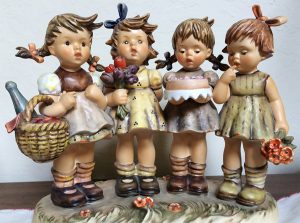 Some of our clients have valuable personal property, such as artwork, antiques, baseball cards, figurines and the like. They may wish to leave such collections in their Wills to a particular person. In other cases, none of the potential survivors is interested in possessing and storing such a collection. This post will address the best means by which to manage collectibles, known as personal property, in estate planning.
Some of our clients have valuable personal property, such as artwork, antiques, baseball cards, figurines and the like. They may wish to leave such collections in their Wills to a particular person. In other cases, none of the potential survivors is interested in possessing and storing such a collection. This post will address the best means by which to manage collectibles, known as personal property, in estate planning.
Collectibles by their nature are of interest mostly only to the collector, who may scour small stores and dealers during his lifetime to obtain such items. The thrill is in the hunt for the unique baseball card that may complete a set and to then enjoy the display of such item in one’s home. Collections of personal property are not only a financial investment to the collector, but provide a lifetime of enjoyment to the collector. Potentially one family member may be interested in acquiring the collection after the person’s death. In such a case, an experienced attorney will advise that the collection be appraised and mentioned specifically in one’s Will, so that it is clear that a particular person should inherit the collection. Then, the person who will receive the collection may receive less from any remaining inheritance to compensate for the value of the collection. For instance, if one child is interested in antique furniture owned by her mother, the mother or the Executor eventually appointed by the Surrogate’s Court can have the furniture appraised. The child who will receive the furniture may receive less cash from the balance of the estate to compensate for the value of the furniture, so that the estate distribution is fair to all involved and the person who appreciates the collection receives it.
Another option is for the collector to give portions of the collection to family members during his lifetime, so that he has the satisfaction of observing the appreciation of family members who receive the items. This is also helpful if the collector is downsizing and selling her home and may not have room for such a vast collection in the new home.
Potentially, none of the potential survivors may have an interest in the collection. The collection will need to be donated or sold after death. In this case, obtaining an appraisal is prudent, so that the Executor can demonstrate that she was in transferring property for the best value possible. Should the estate be taxable, the appraisal will support the value claimed by the estate on the applicable Federal and state estate tax returns.
The collector can be helpful to potential estate beneficiaries by maintaining up-to-date information as to: 1) the items and where they are located, 2) authentication documents, 3) potential valuation and 4) proposed dealers who may be interested in selling the items at a future date. Market conditions can be monitored by the collector or the Executor to determine the most beneficial time to sell the collection.
We advise those who have collections as to the best means to address such items in their estate documents.
 New York Real Estate Lawyers Blog
New York Real Estate Lawyers Blog

